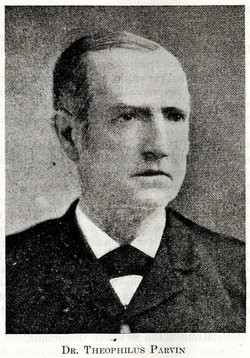Biographical Details
Date of Birth: January 9, 1829
Birth Location: Buenos Aires, ARGENTINA
Graduation Year(s): 1847
Degree(s) Earned: Bachelors
Date of Death: January 29, 1898
Death Location: Philadelphia, PA, USA

Date of Birth: January 9, 1829
Birth Location: Buenos Aires, ARGENTINA
Graduation Year(s): 1847
Degree(s) Earned: Bachelors
Date of Death: January 29, 1898
Death Location: Philadelphia, PA, USA
Theophilus Parvin was born in Buenos Aires, Argentina, to missionary parents. He moved with his parents to Philadelphia, Pennsylvania, and he was educated in Easton, Pennsylvania, before graduating from IU with his bachelor’s degree at age eighteen. He received a Doctor of Medicine degree from the University of Pennsylvania in 1852 and an honorary Doctor of Laws from Hanover College.
Parvin worked as a professor and a physician throughout his life. He was president of the Indiana State Medical Society in 1861, professor at the Medical College of Ohio from 1864 to 1869, professor at the University of Louisville from 1869 to 1872, prison doctor at Indiana Women’s Prison from 1873 to 1883, president of the American Medical Association in 1879, professor at Indiana Medical College in Indianapolis in 1881, and professor of Obstetrics at Jefferson Medical College in Philadelphia from 1882 to 1890. In 1898, he died in Philadelphia and was buried in Indianapolis. His eulogist wrote, he was “a doctor like none other – one who can lead, teach, and write without dishonoring his patients’ needs.”
Parvin married Rachel Butler. She died in 1916 and was also buried in Indianapolis.
Parvin was a major contributor to the medical literature of his day by authoring many lectures, addresses, and treatises on medical subjects. Some of his writings are still cited on current medical websites. He was able to describe and celebrate human female biology in a "colorful" way that was unprecedented in Victorian society. Dr. Herbert Thoms said of his professional writing, “His familiarity with the writings of the ancients as well as with The Bible and The Talmud are greatly in evidence. Although a profound literary stylist, his works show much original thinking which manifests itself in sound and at times prophetic doctrine.” Parvin’s magnum opus, The Science and Art of Obstetrics, was published in twenty-three editions from 1886 to 2010 in English.
In recent years, controversy has arisen over the treatment of female prisoners and Dr. Parvin's research during this period, and especially his views of gender ideology and the concept of sin and reforming fallen women. The phrase "fallen woman" is archaic and was used to describe a woman who had "lost her innocence" and fallen from the grace of God.